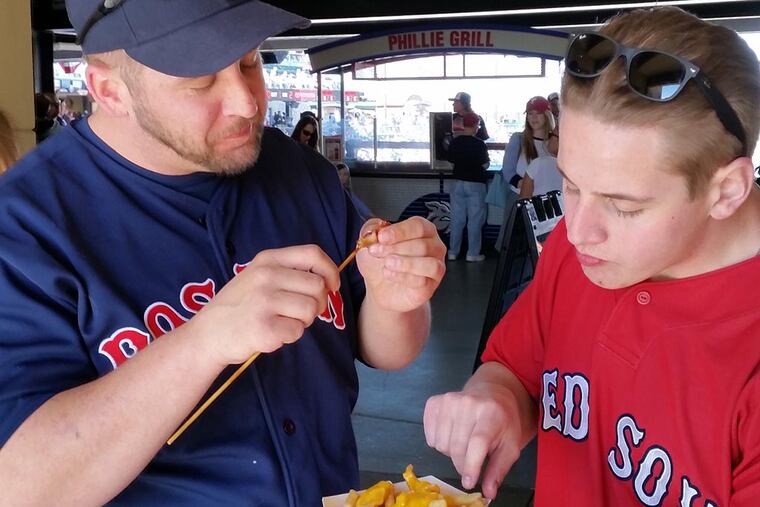Ballpark Bacon Brouhaha
ALLENTOWN - Matt Caton maneuvered around the wood skewer impaling a thick slice of maple-coated bacon. He took a bite.

ALLENTOWN - Matt Caton maneuvered around the wood skewer impaling a thick slice of maple-coated bacon. He took a bite.
"Awesome," he said, chewing happily Sunday on the newest offering at the Lehigh Valley IronPigs' stadium.
Caton knows that a health-focused organization tried to get the team, the Phillies' triple-A affiliate, to ban bacon last year. He didn't know that the Physicians Committee for Responsible Medicine (PCRM) is back again this season.
"Stop complaining and enjoy it with a baseball game," Caton said as the IronPigs battled the Pawtucket Red Sox.
That's easy to do in a bacon-infused ballpark that features a mascot named Chris P. Bacon, and sells chocolate-covered bacon and bacon-scented T-shirts.
But PCRM is not giving up. On Monday, it launched a campaign that might be summed up this way: How about a little love for broccoli?
Specifically, PCRM seeks to add a green-stalked character to the intra-inning mascot dash - the Pork Race - that now features bacon, ham, a hot dog, and a pulled-pork sandwich.
"By encouraging fans to fill their plates with broccoli - filled with fiber, vitamins, and antioxidants - you can hit a home run for health," said the committee, which advocates a plant-based diet and alternatives to animal testing.
PCRM, based in Washington and claiming 12,000 physicians as members, also unveiled an anti-bacon billboard Monday on Tilghman Street near Coca-Cola Park.
"We are not trying to be a killjoy," said Cameron Wells, acting director of nutrition for PCRM. "A heart attack is going to be the bigger killjoy."
Team president and general manager Kurt Landes on Monday quickly shot down the broccoli mascot proposal: "It's a pork race.
"I always considered coming to the ballpark as sort of a nine-inning vacation," he said. "You don't want someone telling you what to wear or where to be on vacation, and you don't want to be told what to eat. This is a reprieve from everyday life. People want to indulge themselves."
For those not looking to indulge, Landes noted that the team offers a range of foods, including gluten-free items, chicken, and fruit salad.
Beyond bacon vs. broccoli, the issue could turn the 10,000-seat stadium into a hotbed of opinions about health, business, and personal choice.
Many studies have linked processed meat to health problems. But it's tough to prove that a specific food choice - such as a ballpark hot dog - triggers a specific issue in a specific person. Some people are genetically vulnerable to ailments. Others are sedentary.
Diet-related health issues such as obesity and colon cancer are about as common in Lehigh County as in Pennsylvania overall, but by some measures, the Keystone State is more plump and less healthy than most states.
About 61 percent of Pennsylvanians are overweight, the state Department of Health says. A report by the Robert Wood Johnson Foundation that cited 20 states with the highest obesity rates in 2013 noted that among them, "only Pennsylvania is not in the South or Midwest." Colon cancer rates are higher in Pennsylvania than nationally, the American Cancer Society says.
Some risky behavior clearly is out of bounds. It's illegal to drive while drunk and people are protected from most secondhand smoke.
But pushing too hard in other areas, such as limiting ballpark fare, can cause people to dig in, said Adam M. Finkel, executive director of a University of Pennsylvania Law School program that focuses on regulation.
"It depends on the politics and the locality and the center of gravity of the people that are involved," he said.
A 2013 Harvard study concluded that in changing behavior, "the least coercive path will be the smoothest."
PCRM did not contact the IronPigs behind the scenes to advocate changes, said Wells, the dietitian. Its goal is to raise public awareness on a range of health issues in a variety of places, she added. (In Green Bay, Wis., PCRM once put up a billboard questioning the healthiness of cheese, which is locally sacred.)
Into this national discussion over health and choices came the IronPigs.
After arriving in Allentown seven years ago, the team, with a name that plays on pig iron from steelmaking, has embraced the pig theme.
"Bacon is important to who we are, to our marketing," said Landes
It became even more important in 2014 when the team decided to further emphasize bacon, putting a bacon-strip logo on some uniforms. Fans ate it up, buying lots of the new team gear. ESPN quoted a team official who said the team had clothing orders from every state within 36 hours.
Drawn by that national attention, PCRM in May 2014 accused the team of "putting the health of your fans at risk."
Landes said that effort made fans more excited about pork products.
Sunday's game seemed to back that up, as adults and children wandered the park clutching hot dogs and pulled pork covered in cheese. The gluten-free stand was far less crowded than the meat markets.
One fan exulted that she got the first chocolate-covered bacon slice of the day. "The food's fantastic," another declared.
And Matt Caton stood to the side, savoring his skewered hunk of bacon. For him, all the high-level debates - and broccoli - miss the point.
"If the team is based on a pig, . . ." he said, licking his fingers.